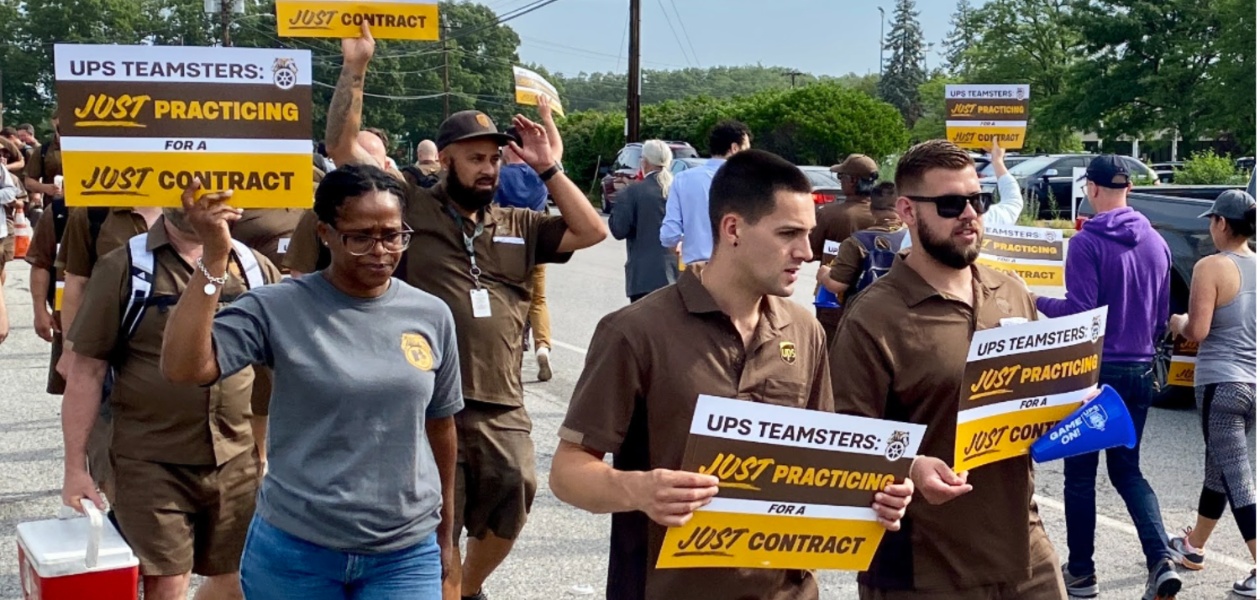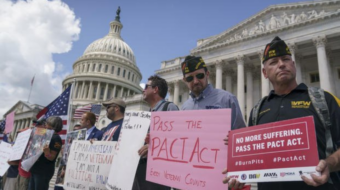
WASHINGTON—A wage and benefits offer from UPS’s brass that one veteran UPS worker—who’s gone through prior strikes—called “low-ball” broke down the company’s talks with the Teamsters on a new contract for the firm’s 340,000 workers.
The offer, at the bargaining table in D.C. early in the week, was so bad that union President Sean O’Brien called it an insult. His team of rank-and-file bargainers got up and walked out of the June 27 session, with O’Brien declaring UPS must put its “last, best and final offer” on the table by the end of June. They returned the next day, and UPS hadn’t budged.
Such refusal means the company would force the union’s members to walk when their current contract expires at midnight July 31, O’Brien said. And, unlike during UPS’s talks with the prior Teamsters regime headed by Jim Hoffa, there would be no extensions.
“The largest single-employer strike in American history now appears inevitable,” said O’Brien after the firm’s offer, which was unchanged from their initial proposal, hit the table.
“Executives at UPS, some of whom get tens of millions of dollars a year, do not care about the hundreds of thousands of American workers who make this company run. They don’t care about our members’ families.
“UPS doesn’t want to pay up. Their actions and insults at the bargaining table have proven they are just another corporation that wants to keep all the money at the top. Working people who bust their asses every single day do not matter, not to UPS.”
O’Brien also warned the union team won’t emulate the Teamsters’ prior leadership and keep talking on and on and on without a strike. In the last negotiations, then-President Jim Hoffa ended with a contract, keeping the hated two-tier wages, that UPS workers rejected. Hoffa’s board, using a now-repealed section of the union constitution, overrode the rejection and accepted the contract.
That sequence angered the union’s UPS workers—one of every four Teamsters–so much that it led directly to O’Brien’s successful insurgent candidacy for the union’s top job. He won it in late 2020.
“When we say the current contract expires July 31, that means we want a new contract in place starting August 1. Not in six months. Not next spring. We demand a historic new contract August 1, with more money in our members’ pockets immediately,” O’Brien told UPS.
“UPS has wasted enough time and hoarded these record profits. Our members want what they have earned.” Added Secretary-Treasurer Fred Zuckerman: “This is what hard bargaining looks like. This is labor’s leverage, and the Teamsters are not afraid to use it. Come August 1, it’s going to be damn hard for UPS to ignore us any longer.”

Neither side released specifics of their offers, but the UPS offer also did not address another big issue for the Teamsters—and for all workers—abolishing two-tier pay systems. Over the years, UPS has shifted more and more of its newly hired drivers to the second, part-time, lower-paid tier.
“UPS has continued to seek a cost-neutral contract during economic negotiations,” the union said in a statement. “The world’s largest delivery company…made it clear to its union workforce it has no desire to reward or respectfully compensate UPS Teamsters for their labor and sacrifice.
“During the past week, UPS returned an appalling counterproposal to the union’s financial package, offering minuscule raises and wage cuts to traditional cost-of-living adjustments.”
UPS, in so many words, profited hugely from the coronavirus pandemic—with its warehouse workers and drivers carrying the load. It earned $13.9 billion in 2022, up $800 million from the year before, and almost double earnings of $8.2 billion in 2019 and $8.7 billion in 2020, a Teamsters-commissioned study, using federal data, says. It forecasts UPS profits rising to $15 billion in 2026.
Executives and financiers have pocketed the money, but workers haven’t, even though they were declared “essential” during the pandemic and forced to take additional risks at work.
From 2012-2022, compensation—pay and perks, such as stock options and other “incentives”—rose by 161% for the firm’s top five honchos, 5.75 times the 28% increase for rank-and-file workers, the report said. That translated into $14.7 billion for workers, while investors piled up $50.7 billion in dividends and stock buybacks. Wall Street investment firms own 72% of UPS stock.
And CEO Carol Tome walked away with $27.63 million in pay, perks, bonuses, incentives, and stock options in 2021, 548 times the median pay of a UPS worker. The median is the point where half the workers earn more and half earn less. The part-time drivers earn less than half the median.
The Teamsters contract is important for several reasons. UPS now has the largest market share of any freight delivery company and the largest profits. It also is the largest private-sector contract in the U.S.
There would be an impact worldwide, too. The same veteran—not a member of the bargaining team—who used the words “low-ball” noted UPS operates in 118 countries and unions there plan to solidarity actions with their U.S. colleagues if there’s no contract. The study reports 17% of all UPS workers toil overseas and they account for 22% of its revenues. The contract’s 340,000 workers do not include the overseas workers.
Before being forced to walk out of the talks, O’Brien and the Teamsters committed to making deliveries through the July 4 holiday weekend and beyond, until the current contract expires. But he pointed out the need to have a tentative agreement to review by the union board and its Teamsters local leaders, before a membership vote, all before midnight on July 31, leaves little time for UPS to present an acceptable offer.
Messages on the web from workers, to the Teamsters and elsewhere, echoed the bargainers.
“All UPS workers are important and essential, including the part-timers,” David Essex wrote on June 27. “We as drivers have to deal with real and very dangerous drivers. It’s very stressful and mentally tiring. What makes it even worse for the drivers and our families is UPS forcing us to work longer days, longer sleeper runs, and only one true day off.
“The runs get longer and longer, accident rates have gone up and morale has gone down all because we are forced to work longer weeks with less family time. Upper management and CEO enjoy lucrative money, lifestyles, and family time while the part-timers, package delivery drivers, and sleeper team drivers make less and work more with less time with our loved ones.”
“Yes, UPS has to offer more, especially to the part-time workers that do most of the work and have a certain time limit on getting it done,” Garry Leon Simmons wrote on June 25. “The last three years have been rough as a UPS worker…Dealing with layoffs, shift losses, and UPS playing games with the Teamsters… We’ve been the face of their profits these last three years and not received hazard pay, another slap in the face…Come August 1st, it’ll more than possible to be a strike. Workers are sick and tired of being sick and tired and time to make note of it.”
We hope you appreciated this article. At People’s World, we believe news and information should be free and accessible to all, but we need your help. Our journalism is free of corporate influence and paywalls because we are totally reader-supported. Only you, our readers and supporters, make this possible. If you enjoy reading People’s World and the stories we bring you, please support our work by donating or becoming a monthly sustainer today. Thank you!










